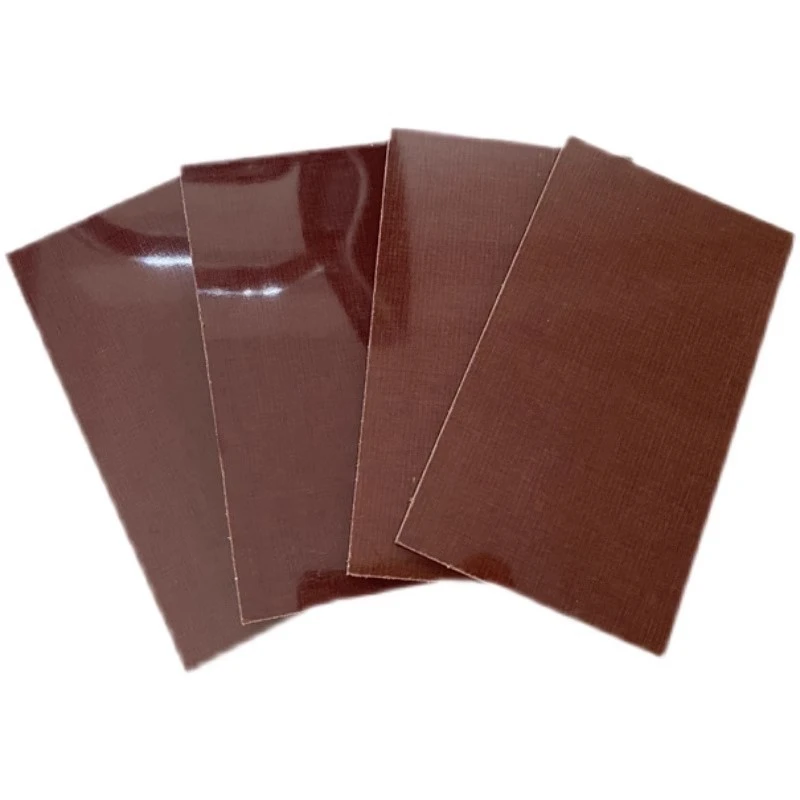Understanding Phenolic Cotton Sheets: Composition and Properties
The Makeup of Phenolic Cotton Sheets
Phenolic cotton sheets are engineered composites that combine cotton fabric with phenolic resin. The manufacturing process involves impregnating high-quality cotton cloth with phenolic resin, followed by careful curing under controlled temperature and pressure conditions. This fusion results in a material that harnesses the natural strength of cotton fibers while benefiting from the heat-resistant qualities of phenolic compounds.
Key Properties of Phenolic Cotton Cloth Boards
The unique composition of phenolic cotton sheets endows them with a range of desirable properties. These materials exhibit exceptional thermal resistance, capable of withstanding temperatures up to 150°C continuously and even higher for short durations. They also boast impressive electrical insulation capabilities, making them ideal for use in electrical and electronic applications. Additionally, phenolic cotton sheets demonstrate good mechanical strength, dimensional stability, and resistance to various chemicals and solvents.
Comparative Advantages Over Other Materials
When compared to other industrial materials, phenolic cotton sheets stand out for their unique combination of properties. Unlike pure plastics, they offer better heat resistance and mechanical strength. In contrast to metals, they provide superior electrical insulation and are significantly lighter. This blend of characteristics makes phenolic cotton cloth boards a versatile choice for applications that demand both thermal and electrical insulation coupled with structural integrity.
Applications of Phenolic Cotton Sheets in Various Industries
Electrical and Electronics Industry
In the realm of electrical and electronics, phenolic cotton sheets play a crucial role. They are extensively used in the manufacture of circuit boards, serving as an insulating base material. Their heat-resistant nature makes them ideal for components that generate significant heat during operation. Transformers, switchgear, and motor insulation systems often incorporate these sheets to ensure safe and efficient performance under high-temperature conditions.
Automotive and Aerospace Sectors
The automotive and aerospace industries leverage the properties of phenolic cotton cloth boards for various applications. In vehicles, these materials find use in brake systems, where their heat resistance is particularly valuable. Aerospace manufacturers utilize phenolic cotton sheets in the construction of aircraft interiors, taking advantage of their flame-retardant properties and lightweight nature. The material's ability to maintain its structural integrity under extreme conditions makes it a preferred choice for components exposed to high temperatures and mechanical stress.
Industrial Machinery and Equipment
Industrial machinery and equipment benefit significantly from the use of phenolic cotton sheets. These materials are employed in the construction of gaskets, seals, and insulating components for heavy machinery operating in high-temperature environments. Their resistance to heat and chemicals makes them suitable for use in processing equipment in industries such as oil and gas, chemical manufacturing, and power generation. The durability and reliability of phenolic cotton cloth boards contribute to extended equipment lifespan and reduced maintenance requirements.
Advancements and Future Prospects of Phenolic Cotton Sheets
Innovations in Manufacturing Techniques
The production of phenolic cotton sheets has seen significant advancements in recent years. Manufacturers are exploring novel techniques to enhance the material's properties further. Innovations in resin formulations have led to sheets with improved heat resistance and mechanical strength. Advanced curing processes are being developed to optimize the bonding between cotton fibers and phenolic resins, resulting in more uniform and consistent products. These manufacturing improvements are expanding the potential applications of phenolic cotton cloth boards across industries.
Emerging Applications in Sustainable Technologies
As the world shifts towards more sustainable technologies, phenolic cotton sheets are finding new applications. Their heat-resistant properties make them valuable in the development of renewable energy systems, such as solar panels and wind turbines, where components must withstand elevated temperatures. The material's durability and low environmental impact align well with the growing demand for eco-friendly industrial solutions. Researchers are also exploring the potential of phenolic cotton sheets in energy storage systems and advanced insulation technologies for green buildings.
Research and Development for Enhanced Performance
Ongoing research and development efforts are focused on pushing the boundaries of phenolic cotton sheet performance. Scientists are investigating ways to increase the maximum temperature resistance of these materials without compromising their other beneficial properties. There is also a growing interest in developing hybrid composites that combine phenolic cotton with other advanced materials to create products with even more specialized characteristics. These research initiatives promise to expand the versatility and applicability of phenolic cotton cloth boards in cutting-edge industrial applications.
Conclusion
Phenolic cotton sheets have established themselves as indispensable materials in modern industry, offering a unique combination of heat resistance, electrical insulation, and mechanical strength. Their versatility across various sectors, from electronics to aerospace, underscores their importance in addressing complex engineering challenges. As manufacturing techniques continue to evolve and new applications emerge, particularly in sustainable technologies, the future of phenolic cotton cloth boards looks promising. Their role in enabling advancements in industrial processes and product development is set to grow, making them a cornerstone material in the ongoing technological revolution.
Contact Us
For more information about our high-quality phenolic cotton sheets and how they can benefit your specific application, please don't hesitate to contact us at info@jhd-material.com. Our team of experts is ready to assist you in finding the perfect solution for your industrial needs.






